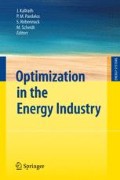Summary
In the electric power industry the observed increases of electricity price dynamics combined with the characteristic periodicity of related decision processes have motivated the use of multistage stochastic programming in recent years to provide flexible models for practical applications in the sector. Specifically in power generation and trading the planning process must obey highly complex interrelations between manifold influences. They range from short term price fluctuations as observed in spot markets to long term changes of fundamental influences. Not only changes in the electric supply system itself must be considered, but also the related availability and costs of required fuels. For example, the prices and usability of natural gas in power generation also depend on the existence of respective deployment and distribution systems. Furthermore the electric power sector is exposed to manifold regulatory uncertainties related to the rules imposed by the responsible authorities. Recently environmental issues have become very popular due to the ongoing discussion on climate change. In January 2005 the European Emissions Trading Scheme (EU ETS) has been launched which by many is considered a new key element in efficient electricity market operations. In this paper we will introduce a modeling framework that considers the influence of emission trading on portfolio problems in the electric power sector by applying clean valuation schemes that particularly take fuel costs, emission efficiency in combination with investment possibilities and generation flexibility into account. Sensitivity analysis is performed with respect to changes in technology, volatilities and price scenarios.
Access this chapter
Tax calculation will be finalised at checkout
Purchases are for personal use only
Preview
Unable to display preview. Download preview PDF.
References
S. Bode. Multi-period emissions trading in the electricity sector — winners and losers. Technical report, 2004. Hamburgisches Welt-Wirtschafts-Archiv (HWWA), Discussion Paper No. 268.
K. Capoor and P. Ambrosi. State and trends of the carbon market 2007. Technical report, World Bank Institute in cooperation with the International Emissions Trading Association, May 2007.
M. A. Carnero, S. J. Koopman, and M. Ooms. Periodic heteroskedastic Re-gARFIMA models for daily electricity spot prices. Technical report, Tinbergen Institute, Discussion Paper, TI 2003-071/4, 2003.
Les Clewlow and C. Strickland. Energy Derivatives: Pricing and Risk Management. Lacima, London, 2000.
E. Delarue, H. Lamberts, and W. Dhaeseleer. Simulating greenhouse gas (GHG) allowance cost and GHG emission reduction in Western Europe. Energy, 32:1299–1309, 2007.
S. Deng. Stochastic models of energy commodity prices and their applications: mean-reversion with jumps and spikes. Technical report, Industrial Engineering and Operations Research, University of California at Berkeley, February 1999. Presented at Uncertainty Workshop, Palo Alto (July 1999).
A. Eydeland and K. Wolyniec. Energy and Power Risk Management. Wiley, Hoboken, New Jersey, 2003.
S. -E. Fleten. Power scheduling with forward contracts. Technical report, Norwegian University of Science and Technology (NTNU), August 1998.
K. Frauendorfer. Multistage stochastic programming: Error analysis for the convex case. Z. Oper. Res., 39(1):93–122, 1994.
K. Frauendorfer, D. Kuhn, and J. Güssow. Stochastische Optimierungskonzepte zur Bewertung von Swing-Optionen. Working-Paper 03-02-1, Institute for Operations Research, University of St. Gallen, Switzerland, 2003.
K. Frauendorfer, G. Haarbrücker, K. Kiske, and D. Kuhn. Swing-Optionen im Elektrizitätsmarkt — Bewertung und optimale Ausübung komplexer Stromderivate. e∣m∣w Zeitschrift für Energie, Markt, Wettbewerb, 2005. Heft 5.
G. Haarbrücker and D. Kuhn; ior/cf-HSG (Hrsg.): Valuation of Electricity Swing Options by Multistage Stochastic Programming, 2006.- URL http://www.alexandria.unisg.ch/Publikationen/29493 (2008-12-02)
N. Haldrup and M. Ø. Nielsen. A regime switching long memory model for electricity prices. Technical report, Working Paper, University of Aarhus, 2004.
R. Huisman and R. Mahieu. Regime jumps in electricity prices. Technical report, Erasmus University, 2001.
J. Hull. Options, Futures and Other Derivative Securities. Prentice Hall, Englewood Hills, NJ, 1994.
International-Energy-Agency. World Energy Outlook 2006, volume 2006. OECD — Organisation for Economic Co-operation and Development, complete edition, November 2006. IEA, Washington DC.
J.P. Morgan Securities Ltd. All you ever wanted to know about carbon trading 5.0, August 2007.
E. Lehrmann. Informationsmanagement im Handel Strom — Eine ökonomische Analyse des Informationseinsatzes aus Sicht deutscher Verbundunternehmen. PhD thesis, Universität — Essen, 2001.
E. S. Lucia, J. J. Schwartz. Electricity prices and power derivatives: Evidence from the nordic power exchange. Rev. Derivatives Res., (5):5–50, 2002.
Robert C. Merton. Option pricing when underlying stock returns are discontinuous. J. Finan. Econ., (3):125–144, 1976.
Dragana Pilipovic. Energy Risk: Valuing and Managing Energy Derivatives. McGraw-Hill, New york, 2nd edition, 2007.
Point Carbon. Carbon 2007 — A new climate for carbon trading, 2007.
PricewaterhouseCoopers. Emission critical, 2004. Connecting carbon and value strategies in utilities. https://www.pwc.com/at/pdf/publikationen/ Emissioncritical.pdf. Cited 8 Sept 2007.
R. T. Rockafellar and R. J. -B. Wets. Nonanticipativity and L1-martingales in stochastic optimization problems. In Stoch. Syst.: Model., Identif., Optim. II; Math. Program. Study 6, pages 170–187, 1976.
V. Scherer. Kombinierte Gas- und Dampfturbinenkraftwerke: Bausteine einer effizienten Stromversorgung. In Walter Blum, editor, Moderne Wege der Energieversorgung, Leipziger Tagung 2002, pages 93–108. DPG Deutsche Physikalische Gesellschaft, 2002.
H. Siede. Multi-Period Portfolio Optimization. PhD thesis, IfU-HSG, Univer-sität St. Gallen, 2000.
J. Sijm, K. Neuhoff, and Y. Chen. CO2 cost pass through and windfall profits in the power sector. Climate Policy (Special Issue: Emissions Allocation and Competitiveness in the EU ETS), 6:49–72, 2006.
Author information
Authors and Affiliations
Editor information
Editors and Affiliations
Rights and permissions
Copyright information
© 2009 Springer-Verlag Berlin Heidelberg
About this chapter
Cite this chapter
Frauendorfer, K., Güssow, J. (2009). Clean Valuation with Regard to EU Emission Trading. In: Kallrath, J., Pardalos, P.M., Rebennack, S., Scheidt, M. (eds) Optimization in the Energy Industry. Energy Systems. Springer, Berlin, Heidelberg. https://doi.org/10.1007/978-3-540-88965-6_20
Download citation
DOI: https://doi.org/10.1007/978-3-540-88965-6_20
Publisher Name: Springer, Berlin, Heidelberg
Print ISBN: 978-3-540-88964-9
Online ISBN: 978-3-540-88965-6
eBook Packages: EngineeringEngineering (R0)

